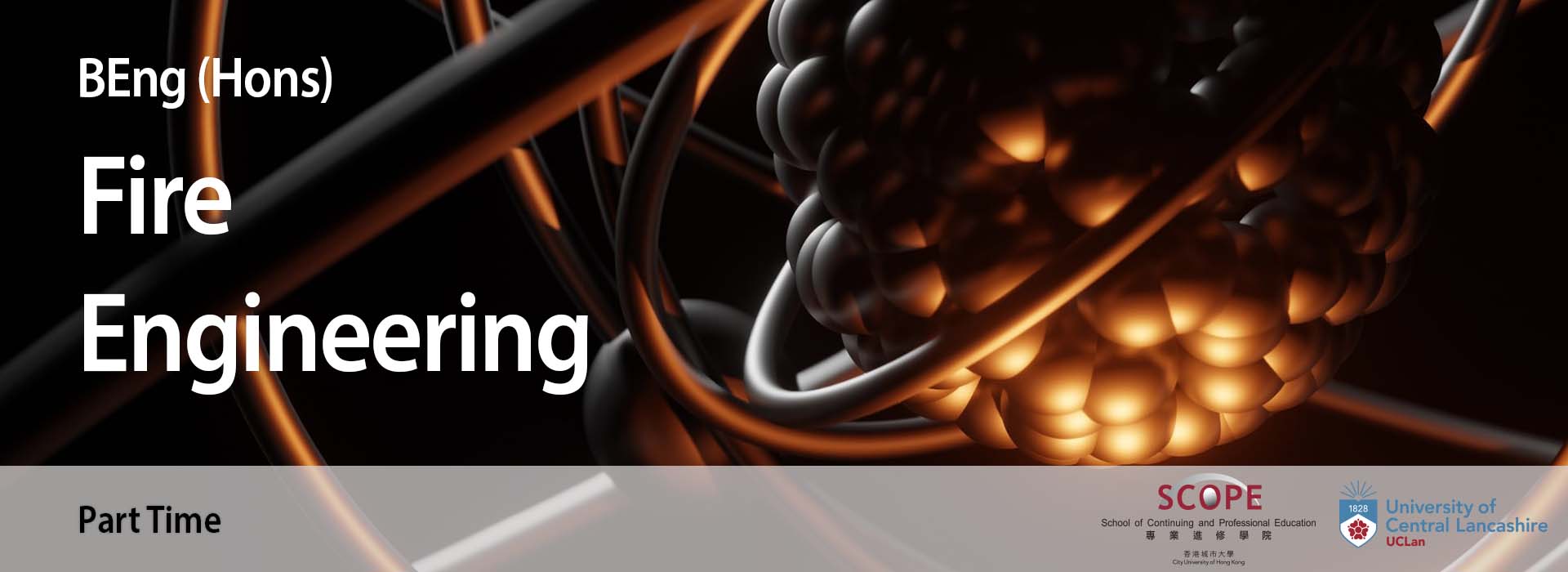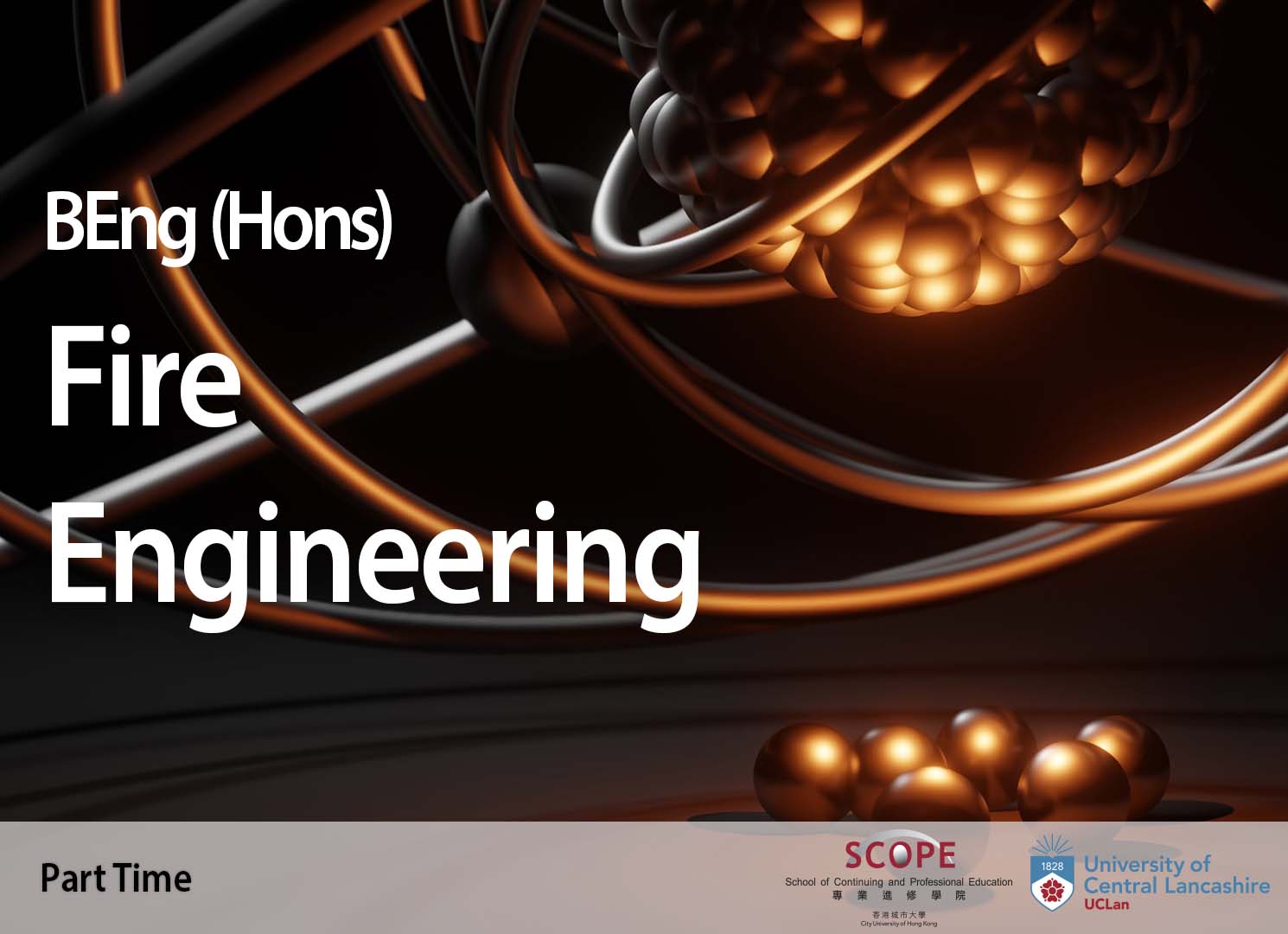BEng (Hons) Fire Engineering, University of Central Lancashire
Module Descriptors


BEng (Hons) Fire Engineering, University of Central Lancashire
Module Descriptors
Module Title: Introduction to Combustion and Fire
This module introduces the learner to the fundamental scientific principles of combustion and fire. The primary goal is to provide students with general understanding and knowledge of combustion, fire and explosion phenomena. The main definitions, approaches and techniques developed in combustion and fire science and engineering are introduced to set the scene for the further in-depth studies through all other fire related modules in the Fire Curriculum. Alongside the introduction to fires and combustion, the module provides basic information and knowledge from related disciplines (chemical kinetics and thermodynamics, fluid dynamics, heat and mass transfer). This introduces all necessary elements, which are required to start a consistent further education in the diverse and multidisciplinary area of fire safety.
Module Title: Fluid Dynamics of Fire
This module aims to enable the students to assimilate the fundamental principles underlying fluid flow and to apply these to flames, fires, and explosions. The module is designed to develop theoretical and practical themes introduced in Level 1. The aim of this module is to further improve qualitative understanding of combustion, fire and explosion phenomena and develop skills in their quantification.
Module Title: Fire and Built Environment
This module aims to develop an awareness and understanding of the impact of fires on the built environment, including building construction methods and materials used, smoke movement and control, law, regulations and standards. It explores different types of fire behaviour in the built environment. The module provides students with case studies of the impact of fires on buildings nationally (UK/HK) and internationally. Through the learning and teaching strategy, the module will also enhance students’ employability skills such as independent working, analysis, problem solving and presentations.
Module Title: Accidents and Catastrophes
This module aims to develop an awareness and understanding of accident and catastrophe phenomena and their impact on society. It explores different types of natural and technological accidents and catastrophes and their effect on the built environment. The module provides students with case studies of the impact of fires on buildings nationally (UK/HK) and internationally. Through the learning and teaching strategy, the module will also enhance students’ employability skills such as independent working, analysis, problem solving, presentations and working with others.
Module Title: Project Management
This module aims to focus on the role and responsibilities of the project manager, together with the leadership and organisation skills essential to the discharge of this function. The application of the role of the professional project manager and associated analytical, monitoring and controlling techniques will be developed.
Module Title: Computational Engineering
The module aims to provide students with fundamental knowledge and skills of using computing in fire hazard analysis. This includes both essential numerical programming skills required to carry out basic engineering computations within generic programming environments and application of specialist software to solve typical computational problems of fire engineering.
Module Title: Engineering Analysis 2
To establish fundamental mathematical skills and provide a framework of mathematical techniques with which to analyse engineering problems; thence to apply them in the analysis and solution of common engineering problems. Students are required to practice solving applied mathematical problems.
Module Title: Enclosure Fire Dynamics
This module builds upon and develops a deeper technical foundation of the fire-science skills and knowledge gained at Level 4 and Level 5 to establish the students’ competence in the understanding of enclosure fires and the dominant mechanisms controlling enclosure fires. The module will also enhance students’ employability skills such as critical thinking, independent research, problem solving.
The module includes a wide range of commonly used relationships, solutions and models as well as information and knowledge across related disciplines (chemical kinetics and thermodynamics, fluid dynamics, heat and mass transfer, etc.).
Module Title: Fire Protection Engineering
This module will look at the principles of fire protection, standard test procedures and methods of solving fire safety problems using active and passive fire safety systems. In particular the focus will be towards innovative/engineered solutions to fire safety problems.
The module aims to develop the student’s skills of numerical analyses and critical evaluation in appropriate fire protection applications.
Module Title: Fire Investigation
The module will develop student’s ability to undertake a scientific fire investigation of a fire scene while ensuring the requirements with respect to safety, scene preservation, evidence collection and presentation are fully achieved.
Module Title: Probabilistic Risk Analysis
This module aims to develop mainstream engineering analysis techniques for engineering students. The emphasis is in application to probabilistic risk modelling. The module will enhance students’ skills of analysis, modelling and problem solving. Such mathematical methods are ‘expected’ across engineering programs throughout the world.
Amongst the methods taught it is intended to focus on matrix and calculus methods:
- Matrices to include Markov chains and linear programming (simplex)
- Calculus to include properties of probability distributions and their application in reliability engineering (MTTF), Laplace transforms. The relationship between Laplace and Markov chains will be reviewed.
- Network methods including reliability, Markov and probabilistic trees.
Applications in fire research will be reviewed.
Module Title: Engineering Design Project
The Engineering Design Project module is designed to provide students with the opportunity to extend and demonstrate engineering design skills both as team members and as individuals. The project will enable students to develop their critical thinking, problem solving and key skills in application to a case study example using appropriate tools of analysis and communication. The module acts as the vehicle for integrating the study themes of design, ICT and technology, in a practical context.
Module Title: Engineering Dissertation
This module aims to provide the students with the opportunity to develop independent research and evaluation skills. On an individual basis the student will be required to carry out an in-depth study involving theoretical, computational, experimental or investigative analysis, or a combination of these. Through the learning and teaching strategy, the module will also enhance students’ employability skills such as written communication skills, independent planning, execution and dissemination of research outcomes.
The information stipulated in this section is subject to continuous reviews and updates of the universities. Changes, additions or deletions may occur throughout the application period and the delivery of the programme.

